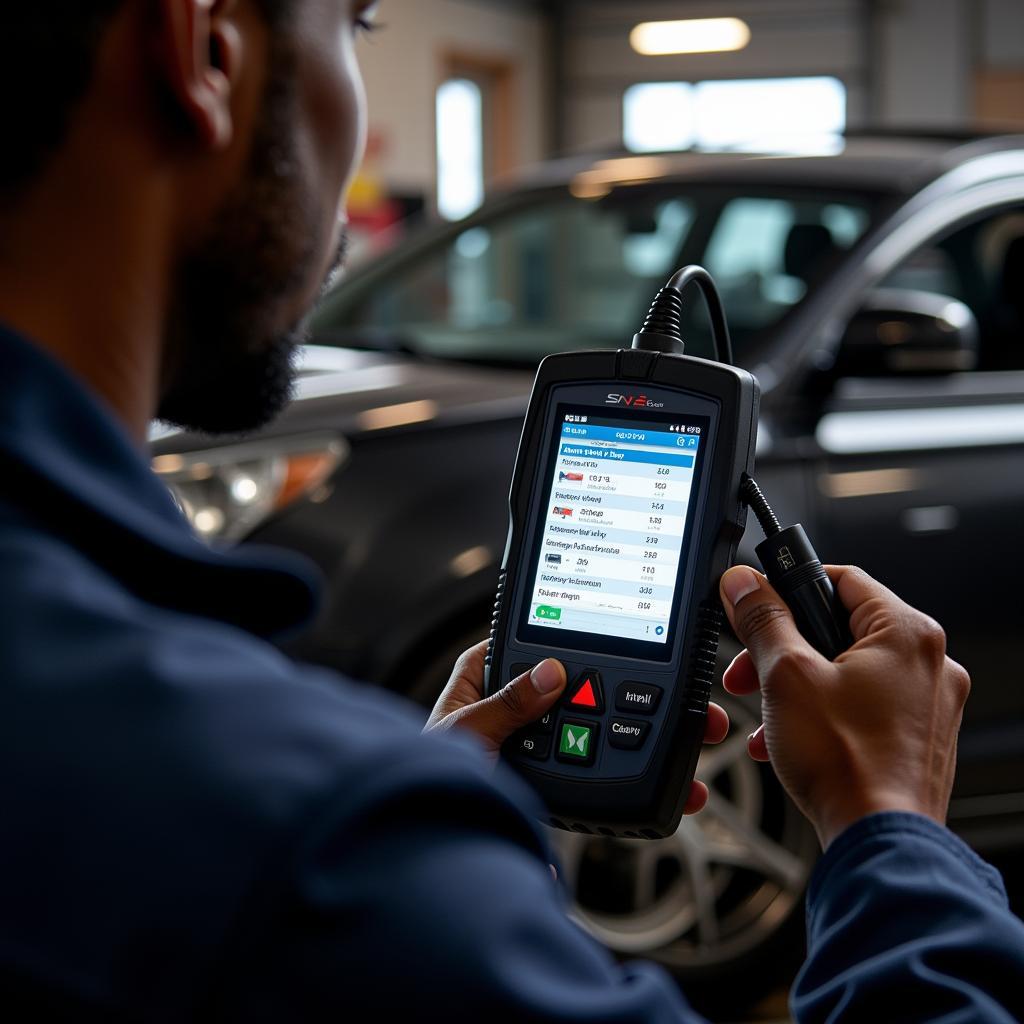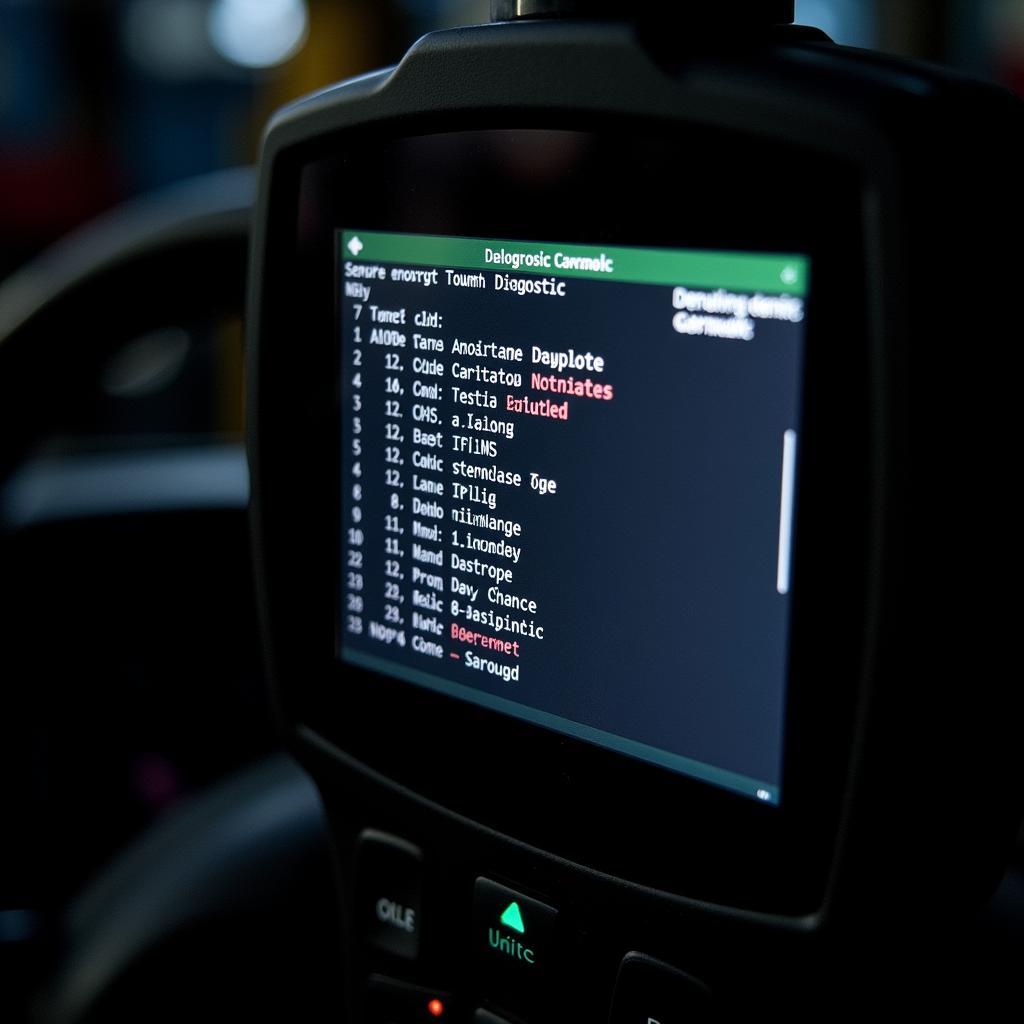Diagnostic tools for cars are essential for efficient and accurate vehicle repair in South Africa. Whether you’re a professional mechanic, a DIY enthusiast, or a workshop owner, understanding the landscape of automotive diagnostic tools available in South Africa is crucial for keeping vehicles running smoothly. This guide delves into the types of tools available, their functionalities, and how to choose the right one for your needs.
After driving for some time, I noticed my car was making a strange noise. I took it to a mechanic, and he used a diagnostic tool to quickly identify the problem. It turned out to be a faulty sensor. This experience highlighted the importance of these tools, especially in a place like South Africa, where driving conditions can be challenging. Using a good diagnostic tool can save you time and money in the long run. You can find good toyota diagnostic tools online.
Choosing the Right Diagnostic Tool for Your Needs
Selecting the right diagnostic tool depends on several factors, including your budget, technical expertise, and the types of vehicles you work with. Do you primarily work on European vehicles, or are you specializing in Japanese makes and models? Are you comfortable with advanced software and complex data analysis, or do you prefer a more user-friendly interface?
Different Types of Diagnostic Tools
There are various types of diagnostic tools for cars available in South Africa, ranging from basic code readers to advanced professional scan tools. Understanding these different categories is crucial for making an informed decision.
- Code Readers: These entry-level tools retrieve basic diagnostic trouble codes (DTCs) and are ideal for DIY enthusiasts.
- OBD-II Scanners: These tools offer more advanced functionality than basic code readers, including live data streaming and the ability to clear codes.
- Professional Scan Tools: These high-end tools provide comprehensive diagnostic capabilities, including bi-directional control, advanced coding and programming functions, and access to manufacturer-specific data.
 OBD2 scanner plugged into a car's diagnostic port in a South African workshop
OBD2 scanner plugged into a car's diagnostic port in a South African workshop
Factors to Consider When Purchasing a Diagnostic Tool
When choosing a diagnostic tool, consider the following factors:
- Vehicle Compatibility: Ensure the tool is compatible with the makes and models of vehicles you work with.
- Software Updates: Regular software updates are essential for keeping the tool current with the latest vehicle technologies.
- User Interface: A user-friendly interface is crucial for efficient and intuitive operation.
- Data Logging and Reporting: Data logging capabilities allow you to track diagnostic information over time.
- Technical Support and Training: Access to technical support and training can be invaluable, especially for complex diagnostic tasks.
The Benefits of Using Diagnostic Tools
“In today’s complex automotive landscape, diagnostic tools are no longer a luxury but a necessity for efficient vehicle repair,” says Johan Kruger, a seasoned automotive technician based in Johannesburg. “These tools save valuable time and money by quickly pinpointing the root cause of a problem.”
Using diagnostic tools provides several key benefits:
- Accurate Diagnosis: Quickly and accurately identify the root cause of vehicle problems.
- Reduced Repair Time: Avoid unnecessary guesswork and part replacements, reducing overall repair time.
- Improved Customer Satisfaction: Provide faster and more efficient service to customers.
- Cost Savings: Reduce the cost of repairs by avoiding unnecessary part replacements and labor.
- Enhanced Safety: Ensure vehicles are repaired correctly, improving safety on the road.
Common Diagnostic Trouble Codes (DTCs)
Understanding diagnostic trouble codes is essential for effective vehicle repair. DTCs are alphanumeric codes that indicate specific malfunctions within a vehicle’s systems.
Interpreting DTCs
DTCs are typically composed of a letter and four or five numbers. The letter indicates the system affected (e.g., P for Powertrain, B for Body, C for Chassis, U for Network). The numbers indicate the specific fault code.
“Knowing how to interpret DTCs is like having a secret decoder ring for your car,” explains Sarah Naidoo, an automotive instructor in Cape Town. “It allows you to understand what the car is trying to tell you.”
 Diagnostic tool screen showing DTC codes in South African auto shop
Diagnostic tool screen showing DTC codes in South African auto shop
Future Trends in Automotive Diagnostics
The automotive industry is constantly evolving, and diagnostic tools are keeping pace with these advancements.
Emerging Technologies
- Wireless Diagnostics: Wireless diagnostic tools allow for greater flexibility and mobility in the workshop.
- Cloud-Based Diagnostics: Cloud-based platforms provide access to vast databases of diagnostic information and remote support.
- Artificial Intelligence (AI): AI-powered diagnostic tools can analyze complex data and provide predictive maintenance recommendations.
For more specialized diagnostic needs, consider toyota diagnostic tools. These specialized tools are designed to interface seamlessly with Toyota vehicles, providing in-depth access to vehicle-specific data.
Conclusion
Investing in the right Diagnostic Tools For Cars In South Africa is crucial for any automotive professional or enthusiast. These tools empower you to accurately diagnose and repair vehicles efficiently, saving time, money, and enhancing safety on the road. By understanding the various types of tools available, the factors to consider when purchasing, and the latest trends in automotive diagnostics, you can make informed decisions that will benefit your business or personal automotive needs. Connect with ScanToolUS at +1 (641) 206-8880 or visit our office at 1615 S Laramie Ave, Cicero, IL 60804, USA for assistance with selecting the perfect diagnostic tool for your needs.
FAQs
- What is the difference between an OBD-II scanner and a code reader? OBD-II scanners offer more advanced features like live data streaming, while code readers only retrieve DTCs.
- How often should I update my diagnostic tool’s software? Regular updates, typically annually or as recommended by the manufacturer, are crucial.
- What are the most common DTCs? Some frequent DTCs relate to oxygen sensors, catalytic converters, and misfires.
- Are there diagnostic tools specifically for electric vehicles? Yes, specialized diagnostic tools cater to the unique needs of electric and hybrid vehicles.
- Where can I purchase diagnostic tools for cars in South Africa? Reputable automotive tool suppliers and online retailers offer a wide selection.
- Do I need training to use professional diagnostic tools? While basic tools are relatively easy to use, professional-grade tools often require training to utilize their full potential.
- Can diagnostic tools prevent future car problems? By identifying minor issues early, diagnostic tools can help prevent them from developing into more serious and costly problems.

